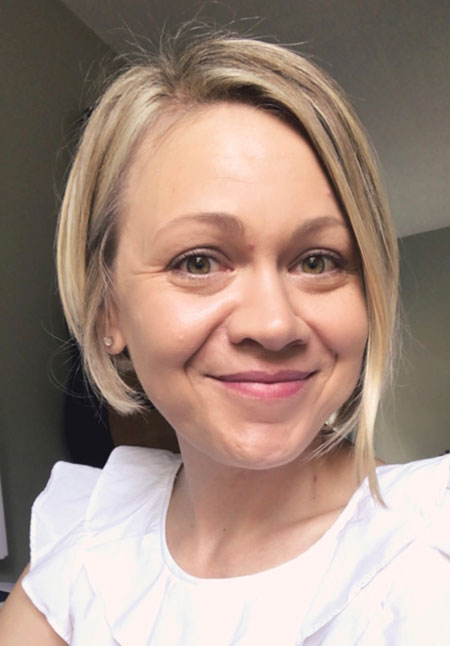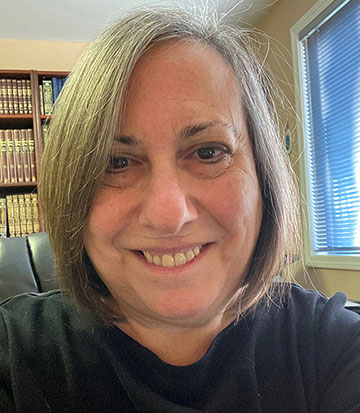
Back in March 2020, when Covid-19 was starting to deeply impact our city, there was a critical need for professional online training as our community quickly moved to a remote-learning environment. Fortunately for John Jay, our Department of Online Education & Support (DOES) stepped up to the challenge and created the Effective Practices for Online Teaching Workshop that successfully prepared over 340 faculty members. This workshop was so comprehensive, practical, and innovative that it recently won the 2021 Blackboard Catalyst Award for Training & Professional Development.
“When the pandemic hit, the CUNY School of Professional Studies was doing this massive effort to try to get people from different colleges and different areas to facilitate online classes for CUNY’s faculty,” says Judith Cahn, Ed.D., Director of DOES. Cahn knew that her department had an infrastructure and resources for online teaching—they had already offered many different webinars for faculty looking to sharpen their online-teaching skills. “We thought, why don’t we take the pressure off the CUNY School of Professional Studies and develop a program for our own faculty? In about a week we turned out the program.” Cahn had a capable, determined group of people at her side, ready and willing to do whatever it took to get the workshop off the ground.
“The workshop opened my eyes to the night and day difference between in-person and online teaching. I was naive to think going virtual was simply giving the identical information via the internet.” —Peter Diaczuk
One of the most essential members of the team was Holly Davenport, Director of Instructional Design at DOES, who developed the workshop’s unique structure on Blackboard. “First and foremost, it was important for the faculty to get some perspective in the workshop. As participants in the workshop, experiencing the online course as students themselves, it gave them the perspective that they needed to be empathetic to their students when it was their turn to teach,” says Davenport. With the help of Gina Rae Foster, Ph.D., Director of the Teaching and Learning Center, and Helen Keier, Associate Director for Learning Management Systems at DOES, the team was able to form faculty cohort groups for each workshop, find talented online workshop instructors within the faculty, and in the process, dramatically change the faculty’s perception of remote-learning education.
“The workshop opened my eyes to the night and day difference between in-person and online teaching. I was naive to think going virtual was simply giving the identical information via the internet,” says Peter Diaczuk, Ph.D., Professor of Forensic Science. “From simple ideas, like maintaining contact with students on Blackboard, to engaging with them and closing the feedback loop online, this workshop has changed my way of thinking and has benefited my students because I’m better prepared to teach them virtually.”
Now, with the recognition from Blackboard and pages of glowing reviews from participating faculty members, the team is starting to process the full impact of their workshop. “Blackboard Learning Management System is a huge, global company. They have their learning management system installed in universities around the world. When you see the list of winners—with only a few from the United States—it hits you how impressive this recognition is,” says Cahn. “This global corporation saw our workshop and applauded our innovation in teaching. They praised us for adding excellence in education. For us as educators, that’s huge.” We sat down with Cahn and Davenport to learn more about their award-winning workshop.
Can you talk about the thinking behind the design of the workshop?
Davenport: Well, the workshop was designed as an online course about online education. The faculty members themselves were students being instructed by other faculty members. They were also given their own Blackboard course to build upon. This was a safe space where they were the instructors, but they could mess up, they could move things around, they could delete, and do whatever they wanted. There were no students there to be embarrassed in front of. Essentially, they were given two roles during the workshop—both student and practice instructor. That was really crucial for them to get an idea of how to best plan their own online courses.
“They were given two roles during the workshop—both student and practice instructor. That was really crucial for them to get an idea of how to best plan their own online courses.” —Holly Davenport
Cahn: One of the things that Gina helped with extensively was the faculty cohorts. We carefully selected those cohorts to keep the same departments and disciplines together so that they could build capacity within departments at the College. That way they could, as colleagues, turn to each other throughout the year if they needed help.

How has Blackboard changed the way faculty views their curriculum and their interactions with students?
Cahn: I think there’s a greater understanding of the environment. There is a greater understanding that they have to be present, even though they are online. They don’t necessarily have to answer every post by a student, but they do have to respond and perhaps synthesize it all. They can be involved through announcements, they can be involved through feedback, and they can offer online office hours through Blackboard.
“Many professors think that they have to teach as a ‘sage on the stage.’ But really, the better mode would be a ‘guide on the side,’ where they’re facilitating the students’ learning. The online modality almost forces that issue.” —Judith Cahn
When you’re in an online environment, there are many interactions going on. The students interacting with the content, the students interacting with the instructor, the instructor interacting with the students, and the students interacting with each other. Many of the faculty members participating in the workshop were not really aware of some of those interactions or how to foster and encourage those interactions. When you’re talking about active learning, it’s not just interacting with the content but interacting with each other.

Many professors think that they have to teach as a “sage on the stage.” But really, the better mode would be a “guide on the side,” where they’re facilitating the students’ learning. The online modality almost forces that issue. That’s why it’s a difficult shift. It’s not just the technology, it’s really the fact that it’s a shift in how you’re teaching.
What aspects of this experience do you think will stay as we start to transition back to an in-person model?
Cahn: Well, I can tell you we’re not getting rid of online education because I just learned that 73 percent of all students who have enrolled to date, that’s 7,200 students, have chosen fully online courses for the fall 2021 semester. So the focus now is on continually improving the quality of the online course experience students are having.
That means that many faculty members will be teaching online more and more, and many might prefer it. Maybe they don’t want to commute into the city. Many may realize that they can retire later because they don’t have to commute. There are a lot of benefits. On the other hand, there are a lot of concerns; when you talk about first-year students getting acclimated into the College and the social experience, that’s so important. There are tradeoffs and there are balances that we have to assess, but online—whether it be fully online or hybrid—is not going away.
Davenport: One thing that I expect to grow is how faculty cohorts create little learning communities as they develop their courses. Because they had the opportunity in the workshop to build something together for the greater good, in the future, I can see everybody having access to the same materials. It could almost be like crowdsourcing the teaching experience, but with people still having the academic freedom to change what they want as long as the core learning objectives were being met.
How do you think the pandemic impacted the way society views online learning and what do you see as the future of online learning?
Davenport: I think that we’re seeing that we can still be productive and do good work—faculty, students, staff, all of us—no matter where we are. We don’t have to come into a specific location and sit down at a specific desk. So, I think that flexibility, and just trusting each other to do what’s necessary, isn’t going away. I think we have a lot to learn from this experience, and with new technology, I think we can get more immersive. Reading and writing is always valuable, and it’s not going to go anywhere, but I think with additional technology and software, we’re going to be seeing a lot more value coming to the online learning space.
“Online learning can democratize education because you’re able to provide access to everybody—even in the far corners of the globe.” —Judith Cahn
Cahn: We have an opportunity to level the playing field with technology. It’s all about access. Online learning can democratize education because you’re able to provide access to everybody—even in the far corners of the globe. If you’re asking about the future of online learning, I think there’s going to be a lot more experiential learning and applied learning online. You can have virtual internships where students don’t have to go out to a corporation, but they can experience working on a real-world project, with a real executive as a mentor, right from their computer. Right now, there’s a lot of emphasis in higher education on “workforce development”—the pathway from education into industry—and the online environment could really help foster the growth of that applied-learning track.



